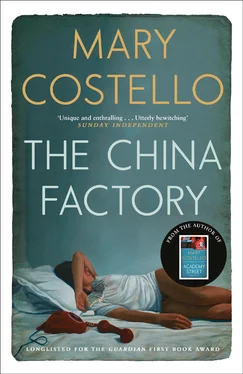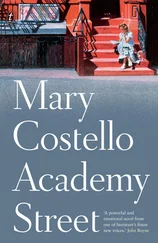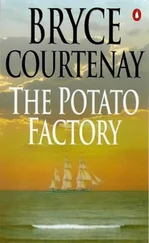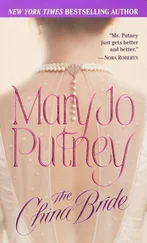Mary Costello - The China Factory
Здесь есть возможность читать онлайн «Mary Costello - The China Factory» весь текст электронной книги совершенно бесплатно (целиком полную версию без сокращений). В некоторых случаях можно слушать аудио, скачать через торрент в формате fb2 и присутствует краткое содержание. Год выпуска: 2015, Издательство: Canongate Books, Жанр: Современная проза, на английском языке. Описание произведения, (предисловие) а так же отзывы посетителей доступны на портале библиотеки ЛибКат.
- Название:The China Factory
- Автор:
- Издательство:Canongate Books
- Жанр:
- Год:2015
- ISBN:нет данных
- Рейтинг книги:5 / 5. Голосов: 1
-
Избранное:Добавить в избранное
- Отзывы:
-
Ваша оценка:
- 100
- 1
- 2
- 3
- 4
- 5
The China Factory: краткое содержание, описание и аннотация
Предлагаем к чтению аннотацию, описание, краткое содержание или предисловие (зависит от того, что написал сам автор книги «The China Factory»). Если вы не нашли необходимую информацию о книге — напишите в комментариях, мы постараемся отыскать её.
In these twelve haunting stories award-winning writer Mary Costello examines the passions and perils of everyday life with startling insight, casting a light into the darkest corners of the human heart.
The China Factory — читать онлайн бесплатно полную книгу (весь текст) целиком
Ниже представлен текст книги, разбитый по страницам. Система сохранения места последней прочитанной страницы, позволяет с удобством читать онлайн бесплатно книгу «The China Factory», без необходимости каждый раз заново искать на чём Вы остановились. Поставьте закладку, и сможете в любой момент перейти на страницу, на которой закончили чтение.
Интервал:
Закладка:
‘You leave the house? At this hour?’
He nods.
An upstairs light goes on in the house opposite. He imagines an infant crying.
‘One night I drove into town,’ he says. ‘It was a warm night last summer. I was so alert… I felt so alive driving out of the estate… It was a Saturday night, Sunday morning…’ His voice is low. He is remembering the hum of the engine. ‘There were girls in short summer dresses climbing into taxis. I kept driving. The city is different at night, bright, edgy… The buildings are watching… I drove along the south city streets… I was stopped at a red light… I felt something… I turned and this girl in the next lane was staring at me, you know, as if she’d been there all the time. At the next set of lights she was there again, the same stare. So I followed her. We raced each other to the next lights, and the next. She turned onto a side street and pulled up. I got out and the first thing she said was “I knew you’d follow me.” She looked ordinary, in dark clothes. I stood looking down at her. I thought it was a very daring thing she had just done and I said so.’
He stops talking and looks at Ann. ‘For me too… it was daring.’
Ann stares at him. Who are you? he thinks. Who are you with that hard face? And then, I don’t care who you are .
‘She was a cop, a detective in the Drugs Squad. She asked me into her flat but I didn’t go. I didn’t. I couldn’t bear the thought of sitting at a kitchen table under a bright light. So we drove. She moved over and I sat in and drove her car out of the city, through the suburbs.’
He remembers her sitting in the passenger seat, their bodies almost touching, as if she were a wife beside a husband.
‘I remember everything,’ he says ‘—the taxis, the litter on the streets, the closed shutters, and then further out — the road narrowing, the hedgerows, the foothills… before we knew it we were climbing. I said we could go back if she wanted. I didn’t want to frighten her. We skirted a forest… I thought of you and the children asleep here. I thought of the way you sleep, on your back, with your mouth open…
‘We pulled over and looked down on the city. I could see the lights on the coast road out to Howth. We got out and walked to the summit. The moon was out. There were old ruins with beer cans and litter strewn on the ground. She said that kids came up there from the city for drug parties. It was strange… so bright and silent and eerie… Beautiful, too.
‘I told her stuff, about you and the kids, and work. I don’t know why I told her… except that she was there…’
He remembers the moment, their perfect stillness. He remembers what he told her. Fears, fantasies, mistakes. She listened, and nodded at times. Her eyes were dead. He talked like it was his last chance at speech, and that she knew this. These nights he thinks of her out there in the city, driving around in her dark clothes and emptied-out eyes.
‘She drove the car back down to the city,’ he says. ‘The sky was lightening by then, the streets quieter. She drove past her own street towards the canal and then parked. We walked through a warren of narrow streets to a flats complex. There were old cars and junk lying around. She put on a dark hat — like a beret — and slipped her arm through mine. We went through an archway into an inner yard. There was a clothesline with children’s clothes on it. Half the flats were boarded up, scrawled with graffiti. There was an atmosphere… like we were being watched. We climbed a stairs stinking of urine and there was a pale girl sitting on a step, smoking, strung out. A door opened then into some kind of service area on a landing and this huge unshaven guy with tattoos stood there looking out as we passed. On the third floor she took out a key and let us into a flat.
‘She was working. She picked up an envelope from the floor inside the door and went into a back room. She was talking on her phone. When she caught my eye she kicked the door lightly to close it. In the yard below there was a vehicle, like an old milk float from years ago, driving in, and the sun was coming up. I was so weary. I kept thinking, I have to get out of here. I opened the door and hurried down the filthy stairs and through the quiet streets until I came to my car… When I got back here you were still fast asleep.’
Ann’s face is white. Her chest is rising and falling. ‘Did you kiss her or…?’
‘No. No.’
‘Did you see her again?’ Her voice is hoarse.
‘I saw her on Grafton Street — I think it was her — a few months ago.’
He stands up. ‘It’s cold… Are you cold?’ he asks. ‘What was her name?’
‘Patty. Patricia, I suppose.’ He puts a hand out to her.
She slaps it away. ‘Shit, Andrew, why are you telling me this? What are you doing to us?’
He feels the breakage in her.
In a few hours the sky will lighten, the streetlights will fade. He pictures them at the kitchen table.
‘When did you grow this cruel?’ She is talking into the dark.
He wonders what time it is. He thinks of time like a small worm crawling across the earth. He opens his mouth and whispers ‘Go back to bed.’
THE SEWING ROOM
Alice sits back and checks the clock. Half past five. She has been sewing all afternoon and she gets up now, goes to the kitchen and makes a pot of tea. She does not eat as there will be a meal later. In her mind she goes over the things she has made ready for the night — dress pressed, shoes polished, handbag and gloves resting on the dressing table. A slight worry persists that the gloves will seem a touch contrived. There will be a parish function later to mark her retirement as a primary schoolteacher. There has never been an occasion in her life in which she has been the centre of attention.
She finishes her tea and returns to the sewing room. Her dress hangs by the window and she stands to admire it. She is a small neat woman and dresses become her. It is straight and collarless, with three-quarter length tapered sleeves, in a light navy brocade, and it has taken three weeks to complete. It is her own design, simple and understated, and she is grateful for the kindness of navy.
In the seven years since her brother Manus’s death she has taken to planning, sketching and sometimes creating her own designs. She buys her sketchbooks — with Japanese girls in silk kimonos on the covers — and HB pencils and black ink pens at the stationer’s in Derry that she has frequented for thirty-five years, taking the Lough Swilly bus to the city one Saturday in every month. With her purchases wrapped and a mildly glowing heart she walks down the street and sits in an alcove of a hotel where she orders lunch. She eats slowly, pencil in hand, and dreams up her designs, and can scarcely contain herself until she is back in her sewing room again.
The room runs the width of the house. She sits at the back window to draw, and sews at the front where the sewing machine is set on a wooden table perpendicular to the window and the inward flow of light. A dark mahogany wardrobe with a long mirror set into its door stands against the wall, bearing down on the room. She gives her designs names; ‘Clara’ is a straight, tailored suit with a short jacket and skirt which she imagines made up in black bouclé wool and jade buttons; ‘New Moon’ is a classic evening gown in midnight blue satin, overlaid with chiffon to create a hint of a shimmer. She imagines them on smart women on New York streets, or on ladies stepping out to the opera on a summer’s evening in Boston.
She moves into the sewing room late in the evenings in a slightly heightened state of mind. She lays tracing paper on the fabric and marks the measurements. She carefully cuts around it, then takes the fabric onto her lap and tacks the pieces together with large white stitching. She crosses the room to the Singer sewing machine and sews in silence, with lamps on, eschewing the radio programmes of concerts and operas and music-hall melodies that Manus had loved. In this room, the silence has its own notes, plucked from the twilight outside and the stone walls and the murmurs of the sea. In the half light of evening she slips into reverie. Hours pass and she cannot account for them. She works into the night, feeling nothing of her body — not even her tired eyes, or the hands that cut and fold and sew. Then she looks up and out of the window at the moon and remembers herself, and the prospect of stepping out of this room or out of this house, ever, is almost too much to imagine. She thinks that it is only her memory and these nightly recalls that have any substance, and that everything else she has ever done — teaching the school children, caring for her mother, tending to this place or sewing these dresses — counts for almost nothing at all.
Читать дальшеИнтервал:
Закладка:
Похожие книги на «The China Factory»
Представляем Вашему вниманию похожие книги на «The China Factory» списком для выбора. Мы отобрали схожую по названию и смыслу литературу в надежде предоставить читателям больше вариантов отыскать новые, интересные, ещё непрочитанные произведения.
Обсуждение, отзывы о книге «The China Factory» и просто собственные мнения читателей. Оставьте ваши комментарии, напишите, что Вы думаете о произведении, его смысле или главных героях. Укажите что конкретно понравилось, а что нет, и почему Вы так считаете.












